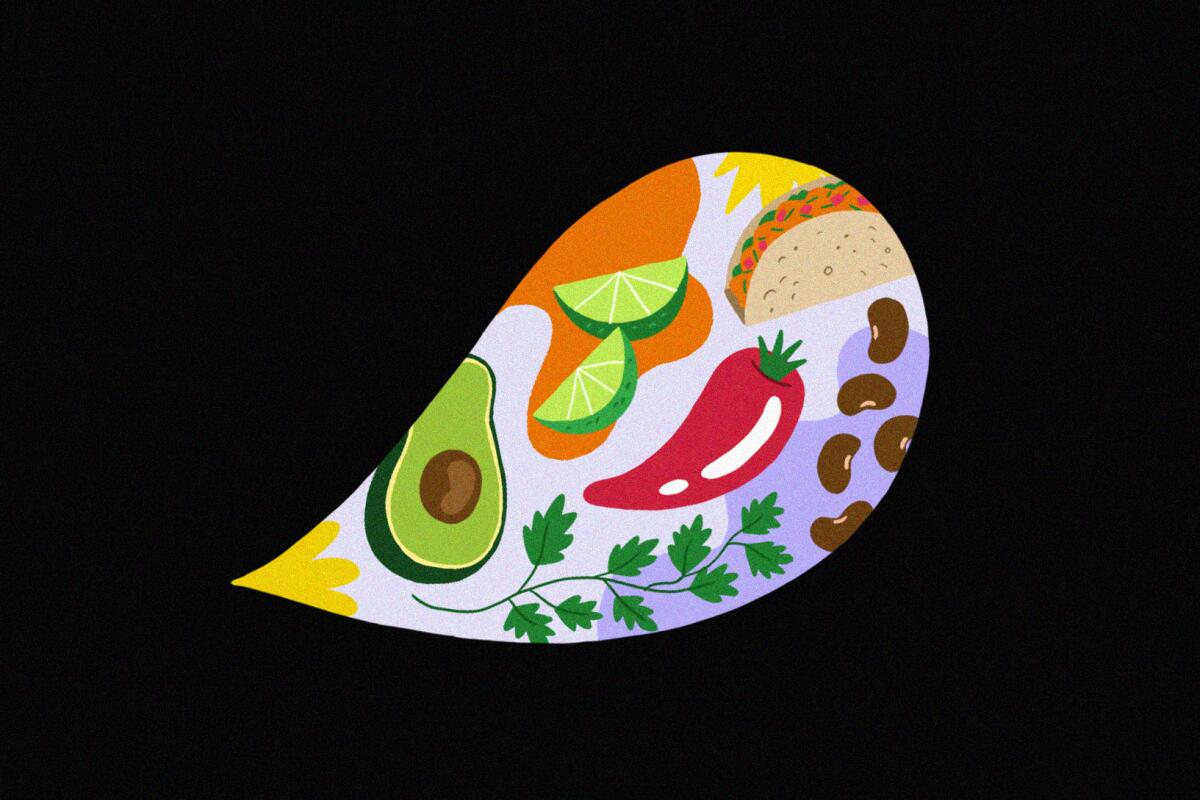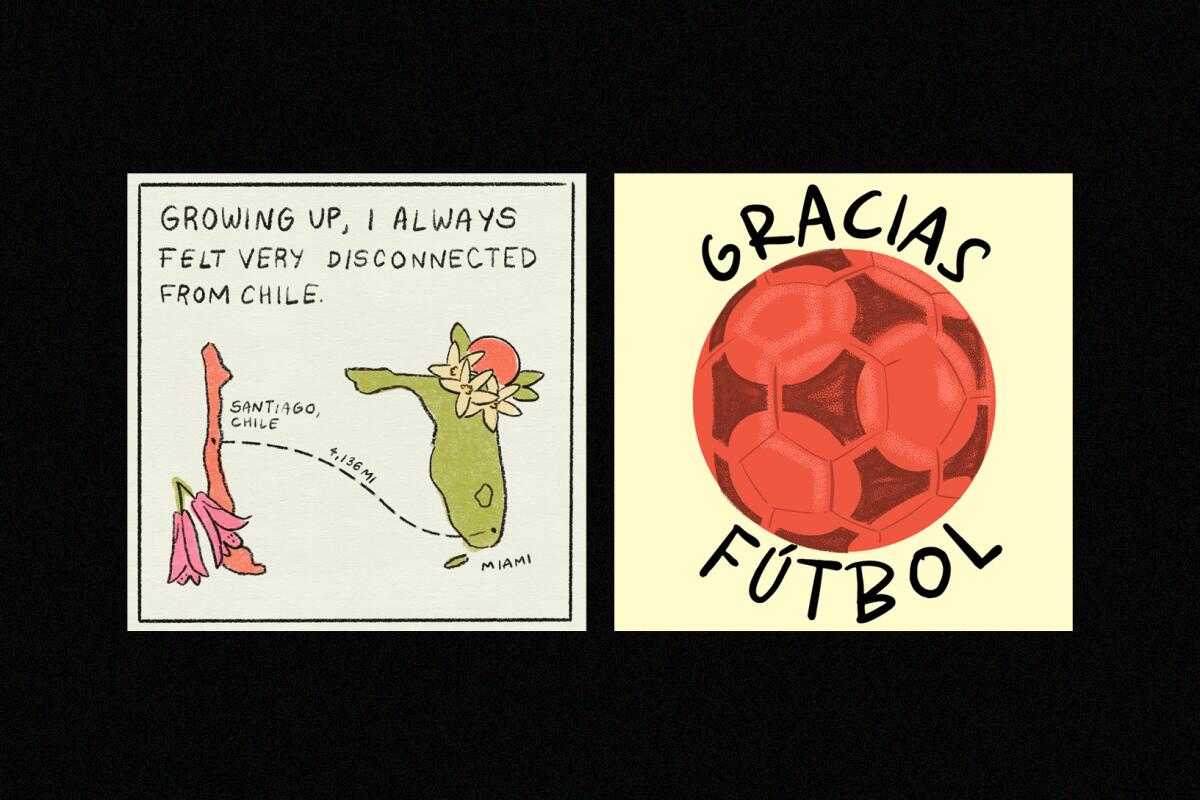Latinx Files: It’s 2023, and for a lot of people, being Latinx doesn’t necessarily mean speaking Spanish

- Share via
There’s a quote in my colleague Karen Garcia’s story about second- and third-generation Latinxs reclaiming the Spanish language that really gets at the heart of what this newsletter is all about:
“I can assure you that there are 62.1 million Latinos in 2020, which means there are 62.1 million different ways of experiencing being Latino,” David Hayes-Bautista, director of UCLA’s Center for the Study of Latino Health and Culture, told Garcia.
Say it louder for the people in the back: There is no one right way to being Latinx!
It’s true that the ability to speak Spanish has long been one of the biggest markers of Latinidad in the United States. But the prominence of Spanish has been on a downward trend for some time. According to the Pew Research Center, the share of Latinxs who said they spoke the language at home declined from 78% in 2000 to 68% in 2021. For those born in the U.S., that drop was more pronounced — from 66% in 2000 to 55% in 2021.
This decline makes sense. After all, more than two-thirds of all Latinxs are U.S.-born, making them more likely to be English-dominant. There have also been historic and systemic efforts to beat — literally, in some cases — the Spanish out of Latinxs.
As Garcia notes in her report, experts call this type of loss “shared language erosion,” which can result in the “deterioration of parent-child relationships due to linguistic and cultural misunderstandings, limitations on parents’ ability to communicate their life wisdom and to effectively monitor and discipline their children, and aggravation of preexisting deficiencies in parent-child attachment.”
The Latinx experience chronicled
Get the Latinx Files newsletter for stories that capture the multitudes within our communities.
You may occasionally receive promotional content from the Los Angeles Times.
In other words, it can lead to feelings of alienation and disconnect from one’s family, culture and heritage. It can also lead to shame.
It’s a sentiment that Garcia is all too familiar with.
“I wrote this story because I’ve dealt, and still deal, with my own insecurities when it comes to my relationship with the Spanish language,” she tells me, saying that she speaks it conversationally and well enough to conduct interviews in it, but still feels self-conscious in the presence of fluent speakers.
“My lack of fluency, I thought, meant that I wasn’t Latina enough.”
It’s hard to blame Garcia for feeling that way. The ability to speak Spanish can bring people closer to their roots, but it can also be wielded as a weapon to cut down others. Marco Rubio famously did it to Ted Cruz in 2016 at a Republican presidential primary debate, and I’ve certainly been guilty (and not proud) of it in the past, too. Many of us have, no doubt.
In fact, I would argue that the impulse to question another person’s Latinidad to feel better about your sense of identity is nearly as big a marker of Latinidad as speaking Spanish.
But maybe it’s high time that we knock it off. It’s 2023, and for a lot of people, being Latinx doesn’t necessarily mean speaking Spanish. There’s absolutely nothing wrong with that, and I think it’s great that there is a movement of people making an effort to reclaim it.
What I appreciate about Garica’s story — in addition to the helpful tips for those looking to do the same — is that it inadvertently throws the question of what Latinidad actually means into the open. Latinx identity isn’t static. It’s ever-evolving and constantly being redefined. That’s a good thing.
Consider subscribing to the Los Angeles Times
Your support helps us deliver the news that matters most. Become a subscriber.
Give Linda Ronstadt all her flowers
Linda Ronstadt is having a moment.
On Monday Spotify reported that streams for her 1970 song “Long Long Time” increased by more than 4,900% after it was prominently featured in Sunday’s beautiful and poignant episode of “The Last of Us” (don’t worry, I won’t spoil anything).
If the post-apocalyptic HBO series is your first introduction to Ronstadt, congratulations! You have stumbled across a genre-bending musical icon. Since you’re here, might I interest you in “Canciones de Mi Padre?”
Released in 1987, “Canciones de Mi Padre” is Ronstadt’s mariachi tribute to her Mexican roots.
“I just wasn’t getting songs that were as good as the songs I learned as a child,” Ronstadt, who was raised in Tucson, told Vogue in September 2022. “I thought they were better songs. They were better constructed. Nicer poetry.”
Though there were some detractors — a Rolling Stone reviewer couldn’t decide if the album was “a deeply felt homage” or “the party-gag album of the year,” a take that did not age well — ”Canciones de Mi Padre” went on to sell more than 2.5 million copies, making it the biggest-selling foreign-language album in the United States. More important, the album signaled to a whole generation of Mexican Americans that there is dignity and value in their heritage.
“Seeing Ronstadt sing in Spanish on national television, her album cover published in newspapers, taught us that it was OK to be unapologetically Mexican, no matter how assimilated we may be,” columnist Gustavo Arellano wrote of “Canciones de Mi Padre” in a 2017 Times op-ed.
Given the subject matter of the top story in today’s newsletter, I’d be remiss if I didn’t mention that Ronstadt herself didn’t grow up speaking Spanish at home, which just goes to show you that there are more ways than one to embrace your culture.
Things we read this week that we think you should read
— More than 40 million people in the western United States and Mexico depend on water drawn from the Colorado River. But chronic overuse and climate change have endangered the water system to the point of near collapse. Over the last two weeks, The Times has published a series of stories, videos and podcast episodes that explain how we got here and what measures are being taken to prevent catastrophe. You can find the very sobering and necessary series “Colorado River in Crisis” here.
— Is Arizona really becoming more purple? My colleague Arit John has this incisive report about how the upcoming 2024 Senate race could be a bellwether of where the state is headed politically.
— The Biden administration is considering a change to the U.S. census questionnaire that would allow people to select “Latino or Hispanic” as their race and their ethnicity. Story by NBC News’ Suzanne Gamboa.
— What I’m listening to: The second season of “La Brega,” a love letter to Puerto Rico in podcast form, kicked off last Thursday. The co-production of WNYC Studios and Futuro Studios will focus on eight songs that define the Puerto Rican experience and begins with “Preciosa,” a song written by composer Rafael Hernández that’s often referred to as the island’s other anthem.
— Congratulations to UCLA historian and friend of the newsletter Kelly Lytle Hernández, whose book, “Bad Mexicans: Race, Empire, and Revolution in the Borderlands,” was named a finalist in the nonfiction category for the 2022 National Book Critics Circle Awards. As I’ve previously written in this space, “Bad Mexicans” does a fantastic job at telling the incredible story of the magonistas — the intellectual forefathers of the Mexican Revolution — while making the very compelling argument that the histories of the U.S. and Mexico are very much intertwined.
— L.A. Taco’s Janette Villafana profiled Jovani Gonzalez, a designer from Glendale who started making tote bags out of San Marcos cobijas and other secondhand items and selling them under his brand “La Segunda.” Gonzalez’s handmade wares have taken off after going viral on TikTok.
— After learning that a tamalera had been robbed at gunpoint, a running club based in the Chicago neighborhood of Pilsen organized to help her and other street vendors out. Story from the Chicago Tribune by Laura Rodríguez Presa.

Pitch us your comic strip ideas!
For the last year we have been publishing comics from Latinx artists around the country and beyond. Fabiola Lara, a Chilean American illustrator, podcaster and YouTuber, shared her experience of rediscovering her roots through vegan Chilean YouTube recipes in this comic. For the 2022 World Cup, we asked Joshua Sandoval, co-owner and creative director of Born in June Creative Studio in East Los Angeles, to share his love for fútbol through this homage, entitled “Gracias Fútbol.”
In 2023, we are looking to commission more comic strips. Do you have an idea or a story you wish to tell? Send your pitches to our art director at [email protected]!
The Latinx experience chronicled
Get the Latinx Files newsletter for stories that capture the multitudes within our communities.
You may occasionally receive promotional content from the Los Angeles Times.




